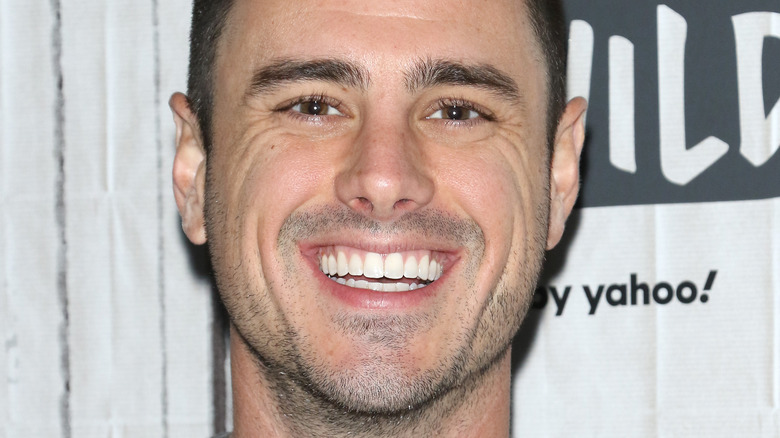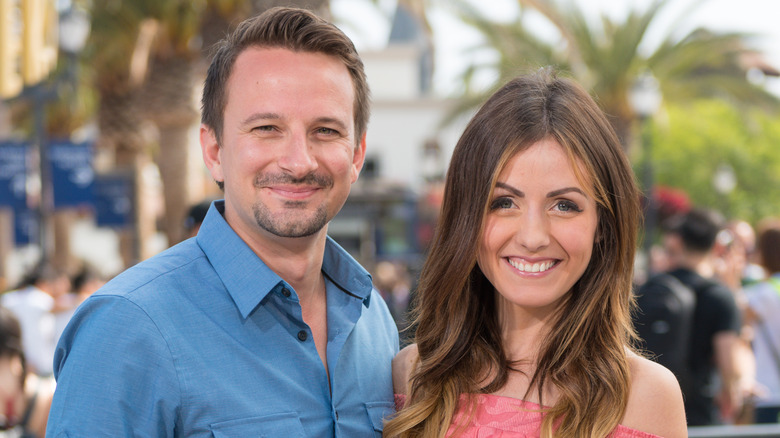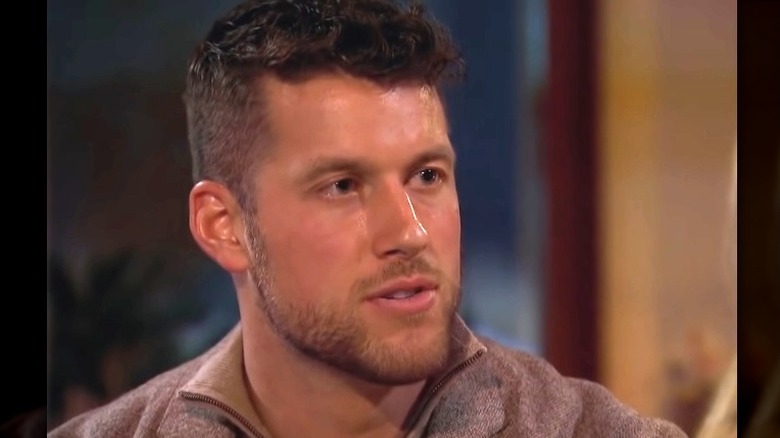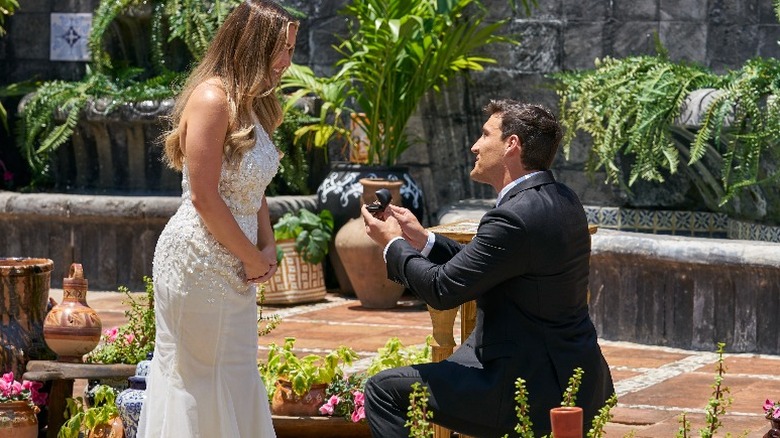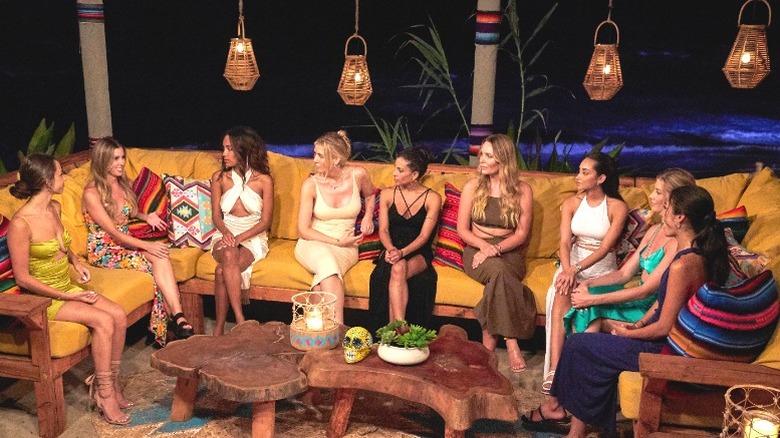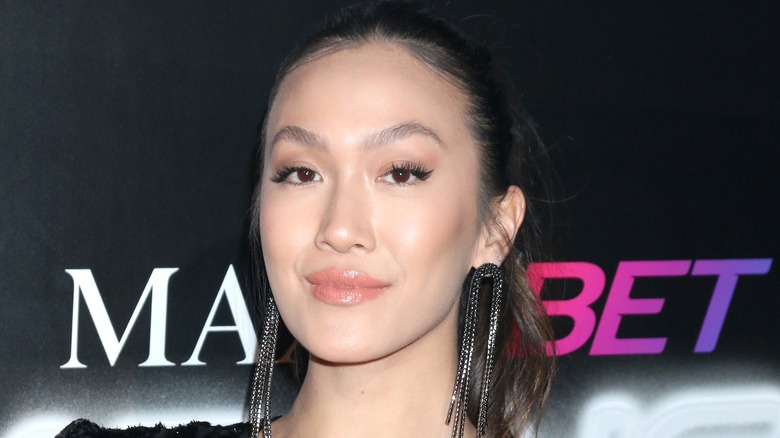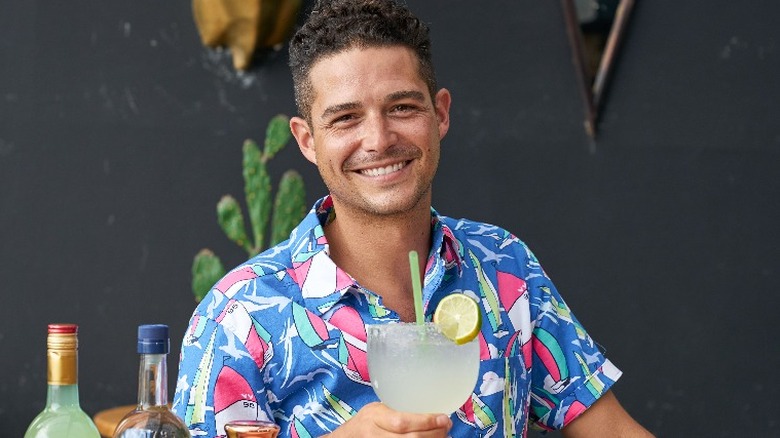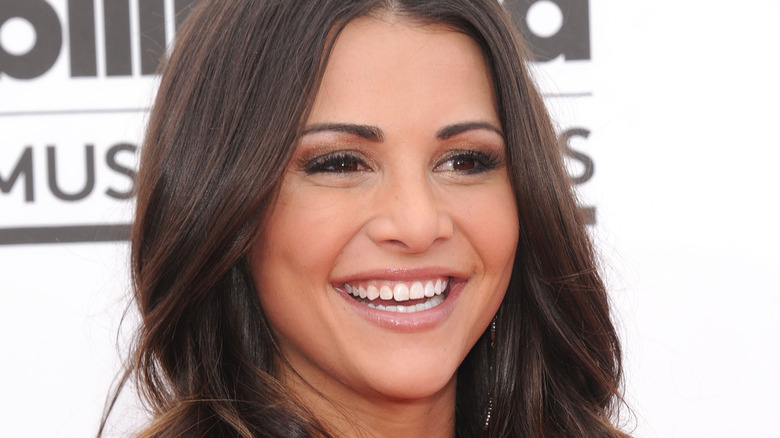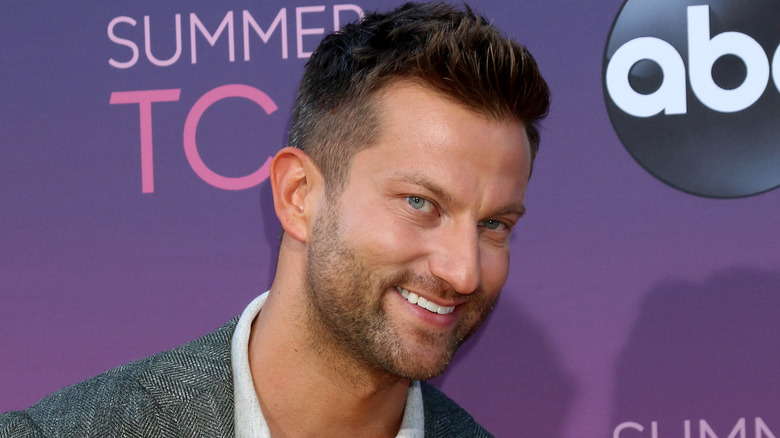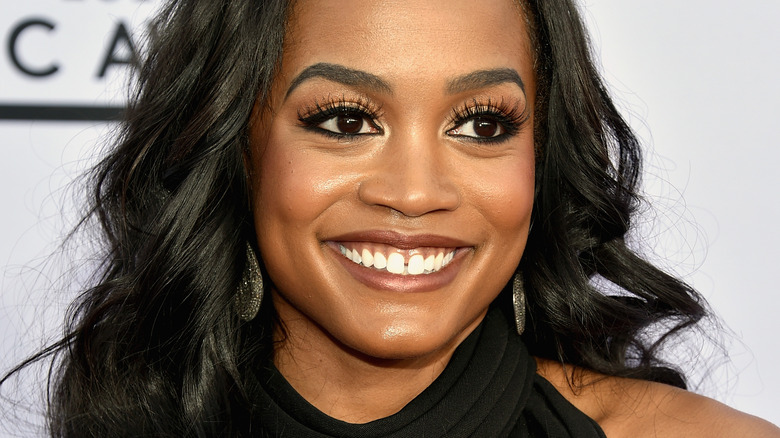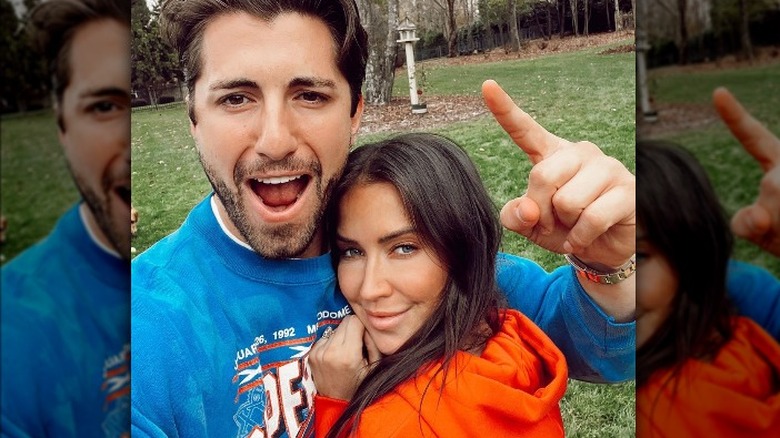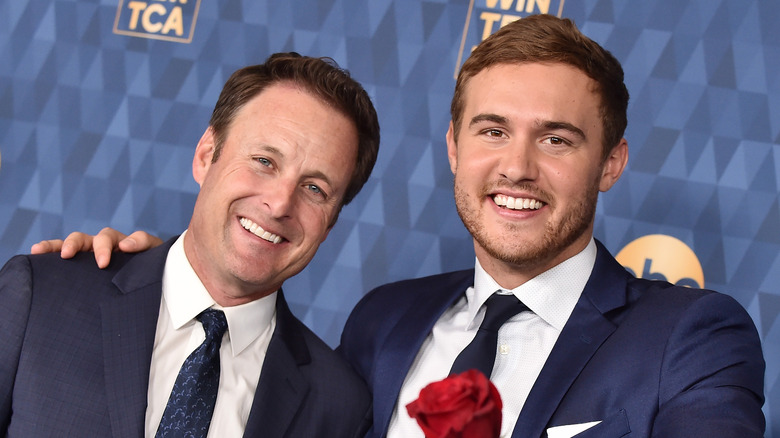Controversial Things Everyone Ignores About The Bachelor Franchise
Back in the early 2000s, a massive wave of reality programming took over the country's television sets. Shows including CBS' "Survivor," Fox's "Joe Millionaire," and MTV's "Newlyweds: Nick and Jessica" brought a new form of TV viewing to the mainstream. And while many of these reality shows wouldn't last more than a season or two, ABC's "The Bachelor" not only prospered over the years but spun off "The Bachelorette," "Bachelor in Paradise," and several other programs.
Premiering on ABC March 25th, 2002, the premise for "The Bachelor" was simple enough. A very eligible bachelor is given the opportunity to date several attractive women (usually between 20 and 30 contestants) for a number of weeks. He must gradually eliminate those contestants with whom he feels no connection, ending with just a few prospects. The Bachelor's ultimate goal is to (hopefully) find his "person" out of the remaining two contestants and finally, after choosing her, get engaged and/or married.
Watchers of "The Bachelor" and its TV relatives know that the shows are far from perfect. These are controversial aspects of the franchise that some fans continue to ignore.
Couples don't usually stay together
While the franchise is immensely successful, that success only seems to apply to the programs itself, not the actual stars or contestants. Across "The Bachelor" and "The Bachelorette," the lack of longevity in relationships of the "winners" is astounding.
Only seven couples who met on "The Bachelor" or "The Bachelorette" have remained married as of 2022 — and not all of those couplings came from famous end-of-season proposals, either. (Jason Mesnick and Arie Luyendyk Jr. both rejected their initial fiancees for other finalists.) Relationship coach Jaime Bronstein told Yahoo! Life, "Statistically speaking, America's breakup and divorce rates are not that far off from Bachelor Nation breakups. These are normal human beings, and not every relationship is meant to last." However, she continued, "'Bachelor' relationships start with the cards stacked against them."
Carly Waddell and Evan Bass can certainly testify to that. Contestants on Season 2 of "Bachelor in Paradise," the pair quickly found love, married in 2017, and ended their marriage in December 2020. Bass said on "Talking It Out with Bachelor Nation" that after leaving the sphere of their reality show experience, "We weren't able to set a proper foundation. [On 'Bachelor in Paradise'], there's nothing going on. You just have to work on your relationship." He added, "When you get out, that transition, I think that's probably where we missed it." Marriages don't always work, but maybe there should be a higher success rate for a show about finding love.
The show puts a spotlight on contestants' worst moments
Much like driving by a horrific accident or watching a bloody hockey scrum, it's difficult to not watch "The Bachelor” for what it is, an emotional train wreck. Clayton Echard had a difficult time handling procedures with his final three contestants after informing them he was in love with each of them. Susie Evans (temporarily) took herself out of the running after learning that Clayton had sex with other contestants in the fantasy suites. Clayton devolved into anger: "If you felt this strongly about this, why wouldn't you have told me early on? ... After everything we went through, after all the feelings, the experiences that we've had, how can you just straight up say, 'I can't move forward...'" he vehemently said. Per Decider, the backlash against Clayton after this long, drawn-out parting was strong.
Viewers can debate whether or not Echard had grounds for being angry, but he certainly wasn't the only contestant to be exposed to the world in a very raw state. Bachelor Arie Luyendyk Jr. broke up with the contestant he had proposed to, Becca Kufrin. As fans know, Luyendyk changed his mind and chose Lauren Burnham, with whom he is now married and shares three children. While this kind of drama is in the show's make-up, what made this particular moment horrifyingly dramatic was the decision to air the break-up live and unedited (allegedly) — this segment took up nearly 40 minutes of the episode. Former Bachelorette JoJo Fletcher tweeted, "STOP. FILMING. HER." The Star called this ending "voyeuristically exploitative." Arguably, Becca had it much worse than Clayton and Susie did.
Unrealistic dating timelines
One of the biggest problems with "The Bachelor" and "The Bachelorette" is the exaggerated timeline for both shows. In real life, some relationships naturally develop at different rates, and a budding couple may go on a few dates over the course of several weeks. "The Bachelor's" filming schedule doesn't allow for such luxuries. According to Yahoo! Life, this truncated timeline isn't the best for contestants.
Add in unrealistic exotic locales used as backdrops for the contestants' dates, and the show has a kind of fake atmosphere that is impossible to match after the cameras stop rolling. Relationship coach Jaime Bronstein told Yahoo! Life, "Due to the nature of the show, contestants need to open up sooner than they usually would in real life..." Bronstein continued, "At the beginning of a relationship when couples fall in love and during the honeymoon phase, their neurotransmitters like serotonin and dopamine put them on a high, which is not bad. Still, it prevents them from thinking clearly, so they might be swept up in the moment and think they are falling in love when in reality, they are falling in love with the idea of being in love versus the actual person." Not to mention the fact that the star of the show might be falling for multiple people at once.
A honeymoon phase can be romantic, but experiencing romance on national television could affect the judgment of the contestants and the Bachelor or Bachelorette alike.
Say goodbye to social media
Yet another criticism facing "The Bachelor" is the show's strict policy to keep contestants shielded from real life. The producers isolate contestants by removing all access to the outside world. No phones. No computers. No social media.
According to The Verge, once prospective contestants are officially cast for a season, they're not allowed any kind of internet access, including the use of cell phones. Leslie Hughes, one of the ladies participating in Season 17 (which featured Sean Lowe as the Bachelor), told The Daily Beast, "The only things I was allowed to keep were my journal and my Bible. We have nothing. We are completely cut off from the world. We have to talk to each other — we have nothing else to do." Tierra LiCausi, another contestant from Season 17 of "The Bachelor," confirmed that the women couldn't read magazines but said they learned a lot about one another's different beliefs through religious discussions. Other contestants said they were permitted to have books and occasionally got to watch movies.
Though such isolation could allow verbal conversations to blossom among those stuck together, it could have significant psychological effects, too. According to Tulane University, "Social isolation's adverse health consequences range from sleeplessness to reduced immune function. Loneliness is associated with higher anxiety, depression, and suicide rates. Isolation and loneliness are also linked to poor cardiovascular health and cognitive function."
If you or anyone you know is having suicidal thoughts, please call the National Suicide Prevention Lifeline by dialing 988 or by calling 1-800-273-TALK (8255).
The use of sensitive buzz words sets bad standards
"The Bachelor" franchise has a long history of focusing negatively on contestants' emotional states. In Season 24 of "The Bachelor," the lack of mental health awareness came to a head when contestants Tammy Ly and Kelsey Weir had an on-camera fight. Ly spoke to Peter Weber (then The Bachelor) and said, "Kelsey was going through a mental breakdown." Ly also accused her fellow contestant of drinking too much. Weir, who some might call the "villain" of the season, heard rumors of these complaints from Weber. She confronted her castmates to find the culprit.
This saga continued between Tammy and Kelsey, with the former saying of the latter, "She's just an emotional wreck." Allegations were thrown around that a couple of the women said Weir was "popping pills," and the drama overtook any real discussion on mental health.
As Health indicated, the wanton use of words like "crazy" and "unstable" (both of which are uttered during the episode) only perpetuate an already stigmatized subject. It seems that the show could use more thorough measures for mental health support during filming. However, perhaps this is changing. Host Jesse Palmer told Variety in 2022, "On set, we have psychologists always there in the moment talking to the Bachelor and Bachelorette and contestants to keep everyone as mentally healthy as possible. That's a massive priority for the show."
If you or someone you know needs help with mental health, please contact the Crisis Text Line by texting HOME to 741741, call the National Alliance on Mental Illness helpline at 1-800-950-NAMI (6264), or visit the National Institute of Mental Health website.
Drink and be merry
According to former contestant Leslie Hughes, the show's producers have been known to ply contestants with drinks. "It's how they get you to be more talkative, more sensitive..." Hughes told The Daily Beast back in 2013. She continued, "When I came in for the producers' weekend, I remember it was like 12 noon, and they were like, 'You want some champagne, wine?' And I was like, 'It's 12 p.m., noon!' And they're like, 'Welcome to the 'Bachelor' family.'"
And while fun is fun, liquor was exposed as the real problem it is on the show in 2017. On "Bachelor in Paradise," accusations arose during the filming of Season 4. While these allegations weren't fully defined to the press, a source close to the scene divulged information to "Bachelor" reporter Amy Kaufman, who tweeted that two of the show's contestants, Corinne Olympios and DeMario Jackson, "got extremely drunk." Kaufman continued, "Corinne came up to DeMario at the bar and kissed him. They proceeded to the pool, where they got naked."
Per People, Warner Bros. Television, who produces "The Bachelor” franchise for ABC, suspended the season and investigated the claim, but found no wrongdoing. However, the show's producers did implement a two-drink-an-hour limit going forward.
If you or anyone you know needs help with addiction issues, help is available. Visit the Substance Abuse and Mental Health Services Administration website or contact SAMHSA's National Helpline at 1-800-662-HELP (4357).
Double standards still exist
One of the show's most valid criticisms is its old double standard. From women being portrayed as vapid sex androids to hysterical, insecure co-dependents, "The Bachelor" reeks of traditional sexual hypocrisy. In an interview with Maria Menounos, her co-host asked former "Bachelor" host Chris Harrison about the sexualization of men on the show. Referring to the men playing strip dodgeball, he asked, "Is there a double standard? Would we have done that to the women? No... Is that a double standard? Yes. Should there be double standards in the world? Maybe."
But where the old double standard really rears its ugly head, as Harrison hinted, is during the show's infamous Fantasy Suites week. In 2014, Season 10's Bachelorette Andi Dorfman was slut-shamed for taking both Nick Viall and Josh Murray to the Fantasy Suite, on separate occasion.
Writing an opinion essay for The Hollywood Reporter, she recalled the responses to the episode. "After that aired, I saw clips of national news anchors on TV calling me a slut. Verbatim. On live national television, calling me a slut. You never see them say that about the Bachelor. Almost every Bachelor has sex with everyone he goes into the fantasy suites with." Two years before Dorfman's piece, Slate highlighted the problematic night that started it all — when Nick Viall sat in front of the audience and told Dorfman during "After the Final Rose," "If you weren't in love with me, I'm just not sure why you made love with me."
A show about finding love manufactures its stories
The proverbial elephant in the room when it comes to "reality" shows in general, is just how much is real? Amy Kaufman explored the franchise's editing in her 2018 book, "Bachelor Nation: Inside the World of America's Favorite Guilty Pleasure." Kaufman learned that editors would "frankenbite" contestants' words, meaning they'd sometimes splice up what contestants or stars said to create a certain image of them (via Page Six).
Accusations of reality shows being scripted programs have dogged these series at least since "Survivor" debuted in 2000, as the show's creator admitted in 2001 that some scenes were recreated and body doubles had been used. There are reportedly no formal, written scripts for "The Bachelor," but it's clear that the show's producers encourage certain storylines, going as far as manipulating contestants to fulfill arcs.
Former "The Bachelorette" contestant Chris Bukowski told Kaufman (via Page Six) that the show's producers interrogated him and influenced his confessional interview. "I was saying lines verbatim from producers because I'd been sitting in a stupid room for an hour and just wanted to go." It should surprise no one that "The Bachelor" tinkers with what contestants would genuinely express. According to a "Bachelor in Paradise" contract obtained by CNNMoney in 2017, a producer holds "the right to change, add to, take from, edit, translate, reformat or reprocess... in any manner Producer may determine in its sole discretion."
Decades of non-representation
Another reasonable charge laid against "The Bachelor" franchise is the complete lack of representation. For almost two decades, all leads on "The Bachelor" were white men. Myah Genung — an associate director at USC's Annenberg School for Communications and Journalism — told The Washington Post: "If you even just pay attention to some of the interviews that Chris Harrison has given over the years, his responses were always in defense of why [they didn't have a lead of color] instead of how this is something that needs to happen. Almost like, 'We have a winning formula right now. Why are you asking us to be something that we aren't?'"
It wasn't until 2021, the show's 25th season, that Matt James became the first Black Bachelor. This step forward was accompanied by a problematic contestant. After Rachael Kirkconnell allegedly liked racist photos online, Matt James told ET, "...you've got to be very careful about what you're doing on social media." He cautioned onlookers to give Kirkconnell a chance to explain herself, adding, "Rumors are dark and they're nasty and they can ruin people's lives." Images of Kirkconnell attending a plantation-themed ball in 2018 soon surfaced.
When interviewed by former Bachelorette Rachel Lindsay for "Extra," Harrison defended Kirkconnell, saying he was waiting to hear her statement. After backlash, Harrison apologized for his behavior toward Lindsay and his flawed stance on the subject in a since-deleted social media post (via Variety), then officially stepped down months later. Speaking on "The View" in early 2022, Lindsay shared that she and Harrison were not in contact and that he had unfollowed her on social platforms.
The influencer's influence
Then there's the double-edged sword that is social media. Bachelor Nation openly encourages fans to interact with contestants and personalities via the well-known hashtag #bachelornation. This makes sense, but there's much more: With the rise of social media, "The Bachelor" is being seen as a launching pad to a whole new career. Desiree Hartsock, a participant in Season 17 of "The Bachelor," told Insider, "People aren't there for the right reasons, to put it frankly. It's too obvious you can then become an influencer if that's what you want to do, which is sad." She added that fame can compromise relationships.
Just how quickly does it take to make that transition from contestant to influencer? Less time than most viewers could probably imagine. According to Refinery29, contestants who survive into week two gain enough Instagram followers to start making money on Instagram. With so much cash on the table for even the first few contestants not given a rose, it's no wonder getting on these shows isn't necessarily just about finding love anymore.
Refinery29 cited figures from a marketing platform, noting that former Bachelorette Kaitlyn Bristowe had a deal with modeling company Revolve that earned the company over $452,100 for just eight social media posts in 2019. Per another marketing agency, stars with big followings are capable of earning thousands of dollars per upload. "Spon-con" (sponsored content) is not new, but the overwhelming rise of Bachelor Nation influencers is still a sight to behold.
But what's it doing to us?
Sure, things are tough for the participants of "The Bachelor." The producers of the show clearly have a narrative they want to tell and contestants are mere "actors" of that narrative. But what toll does regular viewing of these negative traits do to the viewer, the audience? According to Elle, the effects can lead to unrealistic expectations on our partners. As a viewer told the outlet, "The people on the show feel so in love so soon. It makes me question, 'Are [we] not right for each other because we aren't obsessively head over heels and want to spend every second together?' Or, 'We've been together two years now, why haven't we talked about kids?'"
As it turns out, constant viewings of the signs of newly found love — elaborate dates, escape from reality, and all the trinkets that go with new love — could create issues for people in long-term, established relationships. Further, some believe that "The Bachelor" is just perpetuating damaging stereotypes. According to The Middlebury Site Network, "The show portrays troubling stereotypes of femininity — cattiness, weepiness, and a dependency on men. In general, many of the women who go on 'The Bachelor' are framed as overly emotional, jealous, possessive, or outright crazy. 'The Bachelor' preserves an antiquated narrative of gender roles, dating and marriage."
In the end, this show clearly has some negative effects on its stars, contestants, and even the viewers, but that drama! Who can live without all that drama?!?!

